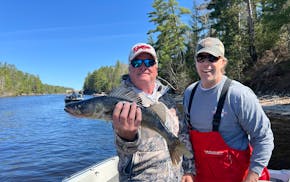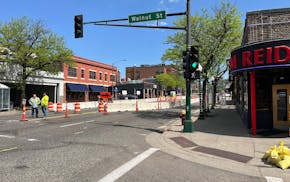VATICAN CITY - Two-and-a-half years ago, Pope Francis was trying to fill a big job. For decades, that position — heading the powerful office that helps vet and select bishops — had gone to consummate Vatican insiders. But Francis had staked his papacy on expanding the boundaries of the Catholic Church. And he had his eye on a surprise contender: an American-born missionary operating in the coastal plains of Peru, some 6,000 miles from Rome.
"You know that I am very happy in Peru," the missionary, then-Bishop Robert Prevost, recalled telling Francis. "But if you ask me to take on a new role in the church, I will accept."
"Pray that I make a good decision," Francis said, according to Prevost's recollection.
In selecting Prevost for that job, Francis fast-tracked the career of the man who'd ultimately become his successor and provided a crucial step in what has now become a singular life path: from Chicago's suburbs to Latin America to the frescoed halls of power in Vatican City, and finally to the very pinnacle of the Roman Catholic Church.
Elected Thursday as Pope Leo XIV, Prevost has become the first pontiff born in the United States — and instantly one of the world's most consequential voices on faith and politics. He emerged from a historically up-for-grabs conclave — composed of 133 cardinals from more than 70 countries — by winning trust and positioning himself as a bridge-spanning figure fluent in five languages with experience on three continents.
By the standards of the church, his ascent occurred with remarkable speed. Before receiving the January 2023 job offer that brought him to Rome, he'd been one of the church's 5,400 bishops — a role with local prominence but no global visibility. Running the diocese in Chiclayo, Peru's fifth-largest city, he'd become known simply as "Monsignor Robert." He operated almost exclusively in Spanish and had gained Peruvian citizenship. When longtime Chicago friend Father Anthony Pizzo visited three or four years ago, he thought Prevost might stay in that post until retirement.
"He seemed so settled," Pizzo said. "That was how he exuded himself."
But church watchers, as well as cardinals and friends, said Prevost had exactly the kind of approach to clerical life that Francis was seeking to promote.
Francis had long talked about making the church less imperious and seeking out leaders who had "the odor of sheep" — meaning they walked among their flocks. Prevost was known in Peru as thoroughly unpretentious. He'd wade into waters during flood disasters and insist on driving himself in a pickup truck along back roads to reach remote communities. "He wasn't a desk pastor," Fidel Purisaca Vigil, a spokesman from the Chiclayo diocese, said this week.
The two had crossed paths decades earlier, when Francis, then known as Jorge Mario Bergoglio, was archbishop of Buenos Aires. Later, when Francis visited Peru, a predominantly Catholic country of 34 million, in 2018, Prevost was on the stage during Mass. And in 2020, the then-pontiff picked Prevost as one of the several dozen members of the bishops' department — a role that required occasional trips to Rome.
By early 2023, Francis had Prevost in mind when it came time to replace the Canadian cardinal, Marc Ouellet, who had headed that department for more than a decade. Ouellet had been seen as loyal to the pope, but with a more conservative bent. And Francis wanted a replacement who'd be more inclined to pick bishops in the pontiff's preferred style, said David Gibson, the director of the Center on Religion and Culture at Fordham University.
"So he brought in a guy who was a total outsider to do a total insider job," Gibson said.
Francis had tangled with conservatives in the American Catholic Church and rarely appointed Americans to top Vatican positions. But he saw Prevost — worldly, self-effacing, a missionary — as "his kind of American," said John Allen, editor of the Catholic publication Crux.
The promotion marked Prevost as a "rising star in the Catholic firmament," Allen said. "Because there is no surer way to gain influence … and make friends."
His appointment as prefect of the department, formally the Dicastery for Bishops, opened the door to recurring Saturday morning sit-downs with Francis to discuss decisions about the future of the church. Those who worked with Prevost saw him as a moderate, a skilled listener, and a manager who ran tight meetings and studied hard. Within months of taking the job, in September 2023, Prevost had been named a cardinal — a prerequisite for taking part in a conclave.
By the time he appeared on the balcony of St. Peter's Basilica on Thursday evening as Leo XIV, Prevost had been a cardinal for just 19 months, making for the fastest leap since Pius XI, who reigned before World War II.
"I think that he rose that quickly because he is a naturally good person," said Cardinal Blase Cupich, the archbishop of Chicago. "He is very authentic and real."
'We saw this coming'
He'd grown up like no pope before him: in a modest brown brick house in Dolton, Illinois, just outside Chicago's city limits and about 30 minutes south of downtown. His mother was a librarian. His father, a high school principal and school superintendent, served in the church as a catechist. His maternal grandparents were Creole people of color from New Orleans. Prevost attended elementary school at St. Mary's in nearby Riverdale, where former classmates remember him as focused, often the smartest in the room, but with little ego.
Back then, many Catholic boys had "visions of becoming a priest," said John Doughney, a former classmate who now lives in Grapevine, Texas. "But if you asked everyone in the class of 1969 at St. Mary's who would actually pursue that route, I think the fingers would be pointed at Robert. If someone were to propose a preposterous scenario such as 'who's going to be pope?' you know, again, we'd kind of chuckle a bit, but we point to Robert."
With a clear interest in spiritual life, he moved away from his parents as a teenager to attend a Michigan seminary high school, run by the Order of St. Augustine. That ancient religious order — originating with hermits living in 13th century Tuscany — had deepened its roots in the Midwest at the time, particularly around Chicago.
Prevost attended another Augustinian institution, Villanova University, where he took courses on philosophers such as Friedrich Nietzsche and earned a degree in mathematics. After graduating in 1977, he started the spiritually rigorous training to become a member of the order at the novitiate of the Order of Saint Augustine in St. Louis. He made his solemn vows in August 1981.
From there, his life became even more itinerant. He spent the early 1980s in Rome studying canon law. Then the order shipped him off to Peru for missionary work. Returning to Chicago in the late 1990s, he became head of the Augustinians' Midwest province. He then parlayed that into 12 years — from 2001 to 2013 — where he led the entire order, overseeing some 2,500 friars around the world, working out of the global headquarters steps from St. Peter's Square.
That administrative job gave him vast managerial experience and the chance to travel to other Augustinian strongholds — in Nigeria, for instance, and the Philippines.
But that stint was not the heart of his career.
What most shaped his life, Prevost said, was the time he spent in Peru — multiple stints adding up to 20 years.
His connections to that nation didn't come by happenstance. The Augustinians, working at the urging of the Holy See to expand the faith to new regions, had accepted responsibility for operations in a part of northwest Peru.
Prevost's deep experience in the country prompted Francis, in 2014, to appoint him head of his own Peruvian diocese, in Chiclayo, an area comprising dozens of parishes, both mountainous communities and towns along the Pacific coast.
Starting a post that would last for almost a decade, Prevost took up residence inside a simple building with a group of priests. He delivered his homilies from a yellow cathedral overlooking one of the main city squares. On holidays or birthdays, he organized dinner parties. And he found time to regularly play tennis, one of his passions, at a seminary across town.
But above all, he became known as a deft conciliator who found practical ways to put Francis' most basic teachings — listening, helping others, particularly the poor and marginalized — into practice.
After a catastrophic cyclone, he waded through flooded streets in rain boots to deliver aid. During a weeks-long miners strike in southern-central Peru, Prevost was part of a group of bishops who stepped in to help mediate between the local community and the mine.
In the midst of the coronavirus pandemic, which was particularly deadly in Peru, the bishop raced to raise money for an oxygen generator and ended up with enough cash for not one but two.
"Many lives were saved," said Janinna Nataly Sesa Cordova, the former Cáritas Chiclayo director, who'd worked closely with Prevost. "Hospitals were overflowing, and with oxygen in homes, families were able to save their loved ones. That really moved Chiclayo."
Then there was the immigration crisis. In his first years as bishop, thousands of Venezuelans were fleeing economic collapse back home and pouring into northern Peru, including Chiclayo. Father Alfredo Perales, a Franciscan parish priest, said it felt like there were Venezuelans begging for money "on every block" in the city.
Francis had made humane care for migrants a hallmark of his pontificate. And Prevost worked with a local Vincentian order to establish shelters. He opened up churches as soup kitchens and asked priests to turn free spaces into makeshift refuges.
"It was like a requirement on his end, because of his commitment before this suffering," Perales added.
"He is a person who is very committed to humanitarian causes, to humble people," said José Gregorio Ceiba Muñoz, a 52-year-old Venezuelan who lives with his wife and two sons in a migrant shelter just outside Chiclayo, and who met Prevost multiple times. "That, for us, is bringing us great joy and hope, especially in this situation we find ourselves in now, as migrants, as Venezuelans."
Peruvian priests say Prevost's ability to understand Francis's vision probably drew him closer to the pope. "That's why the pope entrusted him," said Father Jose Elmer Fernández Díaz, parish priest at the Santa Lucia Church in Ferreñafe, a town about a half hour from Chiclayo.
In 2022, when Francis lost the ability to walk because of knee pain, Prevost spoke empathetically about the pope's "suffering" at a community gathering in Chiclayo.
And when Prevost was ultimately called to Rome to head the bishop's department, it was clear to Purisaca, the diocese spokesperson, and others that he might be on a special trajectory.
"We didn't talk about it openly," Purisaca said. "But we saw this coming."
'Pope Leo XIV will surprise us'
Since becoming pope, Leo XIV has used some of the same language that had become familiar during Francis's tenure. In his initial remarks, he has set out a vision for a church that tends to "those on the margins," and listens to the grass roots, letting the ideas of the faithful filter up to the leadership.
But even the cardinals who elected him say they don't fully know what kind of pope he will be.
When Francis was elected, he was initially portrayed as more socially conservative than his 12-year reign showed.
"Give him space to grow into the office," said Cardinal Wilton Gregory, the archbishop emeritus of Washington, D.C. "There is a tendency to believe that we can capture tomorrow by looking at yesterday. And I think that Pope Leo XIV will surprise us."
In the past, Prevost took several socially conservative stances that conform with traditional church doctrine. In 2012, he spoke critically about "alternative families composed of homosexual partners" portrayed on television. In 2023, he said that ordaining women "doesn't necessarily solve a problem. It might make a new problem."
He has also faced criticism for the handling of sexual abuse cases, including most recently in Chiclayo. In a March letter addressed to the Vatican, the Survivors Network of Those Abused by Priests (SNAP) said Prevost in 2022 had heard complaints from three women, who accused two priests of sexual abuse when they were minors. The diocese forwarded information about the cases to the Vatican — but without collecting testimony from the women, the letter said.
"There is serious reason to believe that Cardinal Prevost did not follow the procedures established by the Holy See," the letter said.
Asked about the criticism of the new pope, the Vatican pointed to a statement by the Diocese of Chiclayo.
The new bishop of Chiclayo, Edinson Farfán Córdoba, this week denied the accusations that Prevost had mishandled the cases and said the church has been supporting the women.
In an interview two years ago with the Vatican's official media outlet, Prevost said that "rules are being put in practice" across the church.
"At the same time, I believe that there is still much to learn," he said. "I think we still have to make great efforts to respond to this situation that is causing so much pain in the church. It will take time."
After Leo XIV's first appearance, hundreds of people packed the Peruvian city's cathedral for evening Mass. Crowds chanted, "The pope is from Chiclayo!" while holding freshly printed banners, including one that read "The Pope has a Chiclayan heart."
"We are all just so excited," said Iris Ajip, 42.
In Chicago, people felt giddy about having a pope whom they'd once known as "Bob" and who roots for the White Sox baseball team. Marianne Follis Angarola, 69, who'd stopped practicing the faith, took it as a sign that "maybe we're meant to go back to the church again."
"I just don't think [his election] could come at a better time," Angarola said.
And in the Vatican, the cardinals who'd spent 24 hours in secret deliberations spilled a few details about their decision — and their sense that Prevost had made peace with the daunting role thrust upon him.
Cardinal Joseph Tobin, the archbishop of Newark, described standing before Michelangelo's "The Last Judgment" during the conclave, saying a few words in Latin before depositing one of his ballots.
"And then I walked back, and I took a look at Bob," Tobin said.
He seemed, at that point, like one of the best contenders.
"He had his head in his hands," Tobin said.
Tobin recalled praying for Prevost, "because I couldn't imagine what happens to a human being when you're facing something like that."
"And then, when he accepted it, it was like he was made for it," Tobin said. "Whatever anguish was resolved by the feeling that this wasn't simply his saying yes to a proposal. But God had made something clear, and he agreed with it."
Schmidt and Padró Ocasio reported from Chiclayo, Peru, and Bellware reported from Chicago. Michael Ruane in Philadelphia and Anthony Faiola in Rome contributed to this report.

Police seeking suspects in shooting of 18-year-old man during fight in Apple Valley park

Dennis Anderson: Crane Lake gives up its walleyes — and its memories

High school senior killed in collision with dump truck at Minnesota intersection

Sinkhole closes part of W. 7th near downtown St. Paul, and officials say repairing the 35-foot deep hole could take months
